Rinus Michels started to get really annoyed with Johan Cruyff. The Ajax coach definitely enjoyed the presence of the young tactical wizard and it didn’t take long for the media to keep on repeating that Michels’ success came as a result of working with Johan… The Europa Cup with Ajax, the silver medal in 1974 with Oranje… The title with Barca. The successes in the US. And without JC, Michels has not really been too successful.
Until 1988. Where the biggest success for Michels was not winning the finals, but in particular winning the semi finals against West Germany. After the heroic game in Hamburg, Michels sighed “Let’s hope that all those musings about 1974 will stop now…”
Total Football, more and more seen as the product of the brain of Cruyff, is now for a while moved aside. He doesn’t just deal with the stories of a generation past, but also with Johan’s shadow. And during the 1988 tournament, Cruyff was again a thorn in Michels’ side.
It is Cruyff who states right before the tournament that Oranje should be seen as a big favorite. In a Spanish newspaper, Cruyff says that Oranje will win the title. “As long as they play with three forwards.”
Cruyff is Ajax coach until January 1988 and impresses with his revolutionary approach. At times only playing with three defenders and putting his team under a lot of pressure. But he does win a European Cup with the youngsters, although PSV proves to be a bit more effective in the Eredivisie. Cruyff would make a similar move as he did as a player and will take up coaching Barcelona, with a similar revolutionary style, introducing Total Football in Catalunya.
And without a doubt, Michels will fear being deleted from the history books in Spain.
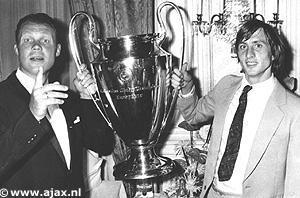
Michels sharing the spotlight with JC
At that time, the south European teams play destructive football. 4-4-2 is the name of the game and Italy and Argentina win World Cups with that system, while Denmark impresses with a similar style. All the big European clubs at that time, Real Madrid, PSV, AC Milan and KV Mechelen all play a similar style. And Dutch coaches like Beenhakker, Hiddink and De Mos prefer playing with two strikers and a fortified midfield.
Cruyff enjoys the opposition: “If they play 2 strikers I can play with only 3 defenders. Meaning I have 4 midfielders to meet their and I have three strikers, to put pressure on the opponent.”
After one game at the Euro, Michels realised that this approach is not holy. The USSR only needs one well placed strike to beat Oranje. And after the first game, Michels immediately responded to Cruyff’s earlier comments. “We are merely an outsider. The expectations are set much too high.”
The coach also criticises his skipper Ruud Gullit: “He missed the boat. He had a free role in this game and he couldn’t support the team when they needed him. And as a team, we are too soft. Not winners. We were losing the game and in the second half we only had four fouls. That is highly unprofessional.”
Gullit is not happy with his new role in the team and Cruyff immediately criticises Michels for not selecting Rob Witschge. The best response however is Van Basten’s. Marco is sharp and he wants to start. At training, Van Basten never plays a decent ball to Bosman, his competitor for the center striker position. Later, Van Basten justifies this like this: “That’s how it works. You try to protect your territorium. It’s egocentric, but that is how it is.”
Just before the Euro, Michels says “We have a system we will adhere to” and “We have had enough time to prepare ourselves”. Only 5 days later, he significantly changes the team. Revolutionary, almost. The concept will be totally changed.
A fortified midfield with work horse Erwin Koeman for artist John van ‘t Schip. And two forwards: Gullit and Van Basten, in the AC Milan set up. John Bosman was striker #1, becomes striker #3. Kieft remains the pinchhitter.
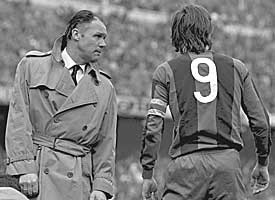
Michels instructing JC… Or… the other way around?
No more wingers. midfielder Vanenburg and forward Gullit need to guard the “operational areas” left and right.
Michels is taking a huge gamble. But, an educated one. Bssed on intuition, his analysis of his players and opportunism.
The second game, the win against England, was not built on the Dutch football culture or well prepared tactical prowess. The victory was based simply on the class of one Marco van Basten and luck. Luck, as England hit the post twice in the first half and one of the MVB goals might have been offside.
Wim Kieft has an impact in this game as well. Michels knows a win is key and brings the target man. Once criticised by Marco van Basten, his successor at Ajax, once called him “that big tree”, but apart from being a great header of the ball, Kieft also excelled in keeping the ball and distributing the ball to the moving players around him. A combination of a good touch and vision. Kieft is the perfect lightning rod for Van Basten in the second half.
Against Ireland, another finals, Holland needs a win. Ireland can make do with a 0-0. And it seems for a long time that this would be the final score. John Aldridge is closest to the winner, with a header which might have been blocked by Vanenburg’s hand, and maybe even behind the goal line. Michels needs to change his line up again. Midfielders Muhren and Koeman are benched, and Bosman and Kieft are brought in. Holland plays with 5 forwards: Vanenburg, Gullit, Van Basten, Bosman and Kieft. And it works! There will be no smooth attack via the wings, but it takes a failed half volley by Koeman. The ball could have ended up in the stands, but it bounces onto the head of the attentive Kieft, pure luck, who instinctively tries to flick the ball on. The curve on the original ball, the Koeman volley AND Kieft’s header lets the ball bounce out of reach of Pat Bonner and seems to go past the goal, only to make a billiards-like shift and bounces into the goal.
This is a goal that has never been copied. There are no other goals like this one. That much coincidence in one passage of play.
Michels feels liberated and he embraces every piece of luck that comes his way. He becomes creative and even playful. And he calls this 1988 team stronger than the 1974 team… hmmm….
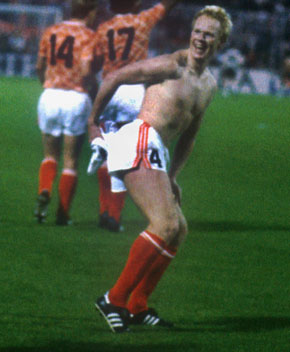
Koeman wipes arse with Thon jersey
And he likes to pay out Cruyff once more. “Cruyff is merely a starting coach” and he even calls him a psychopath. Michels says about his successes with Ajax: “Ah, successes with Ajax in the Eredivisie? What does that mean? It’s a boyscout competition. What we need today, are football soldiers. Players who can suffer and battle. Every game we play is a battle. I am not talking about Cruyff, but players like Van Hanegem! Neeskens!”
Marco van Basten assumes that role against West Germany. He is not the Cruyff of the team, he is the Van Hanegem. He doesn’t walk away from being an irritating prick on the field. But Van Breukelen and Koeman join in as well. The goalie yells at Matthaus “I hope you fucking die!” when he is rolling around after a dive and Ronald Koeman wipes his ass after the game with Thon’s shirt. The victory is a celebration and releases pent up anger and frustration. The Dutch School is totally ignored. This victory is not build on positioning or total football. This Euro was a dirty Euro. And Johan Cruyff gets more and more quiet.
Oranje played like Argentina. Not like Brazil. Aad de Mos commends the coach’ ability to build up the mentality of the players, more than his tactical smarts. Two great passers from the back (Koeman and Rijkaard), two players who can decide games (Gullit and Van Basten) and two iron-eaters (Erwin Koeman and Jan Wouters)
There was the speed of Van Aerle and Van Tiggelen, allowing Oranje to play high. Vanenburg and Muhren were the ideal connecting players in midfield, who completely sacrificed their dominant roles ( both playmakers at PSV and Ajax).
All those qualities came together on June 25, 1988. Van Breukelen chokes Belanov when he is about to take his penalty and gives the signal of invincibility. This Oranje is not built on attractive and dominant play. Oranje’s success was built on willpower and determination. And luck.
The England and Ireland game, we discussed. The penalty against West Germany was another gift. Van Breukelen’s stopped penalty was a bonus and Van Basten’s volley was an eternal gem, but that ball could have ended up anywhere in the stadium.
The 1988 team has not captured the hearts of the world, like the Naranja Mecanica did in 1974.
Michels will embrace the 1988 campaign as his great success but the rift between Cruyff and Michels has not done Dutch football many favours.
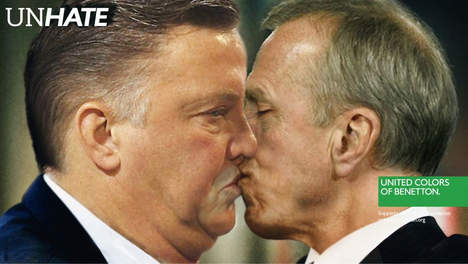
Did LVG and JC have an affair???
Oranje could have put the cherry on the cake in 1990 with a strong squad and with JC at the helm. But Michels clearly refused to let his victory be overshadowed and he decided to stonewall the players.
Cruyff never officially got the reigns over Oranje. His influence was ever tangible though. Louis van Gaal took JC’s textbook and gave it his own spin. Van Gaal also incorporated a lot of Michels in his approach. But Van Gaal did not (yet) manage to become the new Cruyff or Michels. The pompous one failed miserably in 2000, when he believed to have the strongest Oranje squad ever. Ireland and Portugal were too strong. Van Gaal misses the intuitive smarts of Michels and the creative genius of Cruyff.
The 1974 squad has a heroic glare. The longhaired rebels, all seemingly playing their own game, and in the process tearing Argentina, Brazil, Uruguay and West Germany apart (albeit without winning vs West Germany, of course…).
The 1988 squad did not bring Holland anything but the silverware. No tactical finesse, no remarkable legacy.
The individual strength of players like Gullit, Van Basten, Koeman, Wouters and Van Breukelen will forever live on, of course as will the fact that almost every player of that squad became an active coach at some time. Passing on their experience and insights.
And it’s not just the Rijkaards, Koemans and Wouters we are talking about. Arnold Muhren was a youth coach at Ajax for a long time, like Van Tiggelen is still coaching at amateur level. But also players who were just not good enough for Oranje back then (Danny Blind, Wim Koevermans, Peter Bosz, Gertjan Verbeek, Fred Rutten, Ruud Brood, Ton Lokhoff) are all active in some form in pro football today. Bosz at Vitesse, Verbeek at AZ, Brood at Roda JC and Lokhoff was at VVV most recently.
Outside of Holland, 1988 will be remembered for the charisma of Gullit and Van Basten. “Achtentachtig allemachtig prachtig” is a term you still hear from taxi drivers in Thailand, Egypt, Mexico or New Zealand. And Van Basten was knowns as the Son of Cruyff while Gullit became a superstar, the first coloured player to accept a major trophy as skipper.
This social cultural heritage appeared more important for The Netherlands than the football legacy.
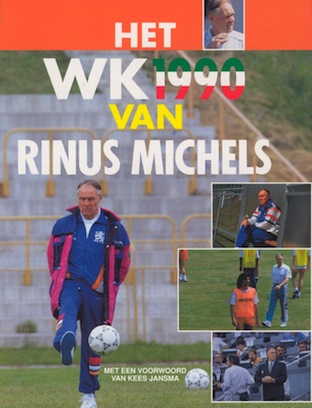 The book written on that weird 1990 campaign…
The book written on that weird 1990 campaign…
